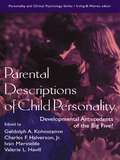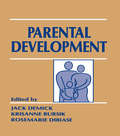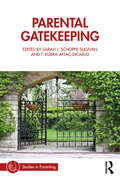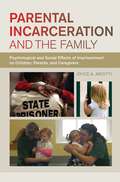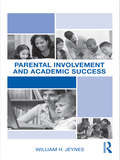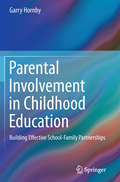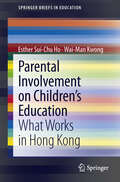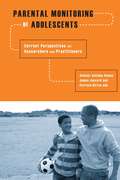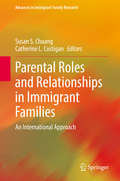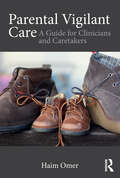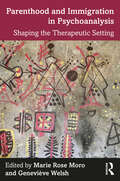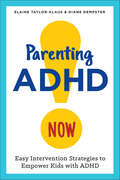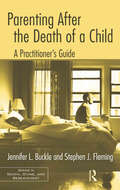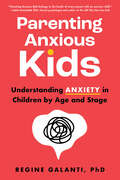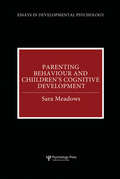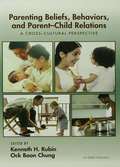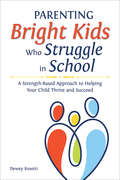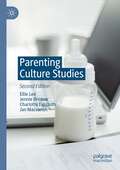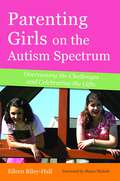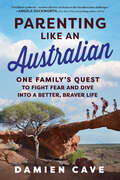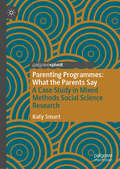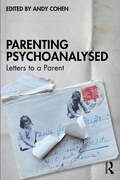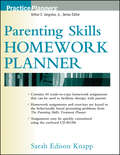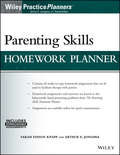- Table View
- List View
Parental Descriptions of Child Personality: Developmental Antecedents of the Big Five?
by Jr. Geldolph A. Kohnstamm Charles F. Halverson Ivan Mervielde Valerie L. HavillThis book reports the first attempt in the child development literature to examine the structure of early personality based on parents' free-descriptions of their children. It is an important piece of research because of its cross-national focus on personality development. The authors present a data set that reveals considerable consistency in the parental descriptions of child personality in both western and nonwestern countries. This consistency supports the cultural universality of the "Big Five" personality factors. The authors' findings lay the foundation for an examination of how these major dimensions of childhood personality structure evolve into adult personality structure.
Parental Development
by Jack Demick Krisanne Bursik Rosemarie DiBiaseThis volume seeks to identify and define the parameters of a relatively new problem area -- parental development. Drawing on the grand developmental theories of Sigmund Freud, Lawrence Kohlberg, Jean Piaget, Lev Vygotsky, Heinz Werner, and their descendants, this book has the potential to generate an area of common concern for those interested in either child/adolescent or adult development through the novel application of developmental principles and considerations to the ecological context of parenting. To that end, this volume brings together theory and research from the subfields of adult and child/adolescent development. Chapter authors place the problem area of parental development in theoretical context and examine selected psychological part-processes implicated by focusing on cognitive and psychosocial development. The authors then deal with a range of issues that are perhaps less traditional and/or more in line with the complex character of everyday life. That is, they utilize either relatively novel comparison groups or treat parents at later stages of development rather than those in young adulthood as is often the case. Finally, the authors uncover both similarities and differences among their theoretical perspectives with an eye toward delineating some possible future research directions.
Parental Gatekeeping (Studies in Parenting Series)
by Schoppe-Sullivan, Sarah J Aytaç-DiCarlo, F. KübraThis pioneering volume reviews theory and research on parental gatekeeping—the extent to which parents support or thwart each other’s involvement in parenting.Chapter authors review theories, conceptual models, and measures of gatekeeping, and evaluate its consequences for parent-child relationships. Offering a holistic perspective, this book not only explores mothers’ gatekeeping of fathers but also considers the potential roles of others, including fathers, as gatekeepers. Chapter authors also explore parental gatekeeping processes in at-risk families, including separated and divorced families and those with adolescent and nonresident fathers. This book summarizes the key findings and critical gaps in the gatekeeping literature and suggests important directions for future research.This landmark text will be of interest to all students and scholars who study parenting, child development, and families. It will also serve as a valuable guide to future scholars in the burgeoning field of parenting research.
Parental Incarceration and the Family: Psychological and Social Effects of Imprisonment on Children, Parents, and Caregivers
by Joyce A. ArdittiWinner of the 2014 Outstanding Book Award presented by the Academy of Criminal Justice SciencesOver 2% of U.S.children under the age of 18—more than 1,700,000 children—have a parent in prison. These children experience very real disadvantages when compared to their peers: they tend to experience lower levels of educational success, social exclusion, and even a higher likelihood of their own future incarceration. Meanwhile, their new caregivers have to adjust to their new responsibilities as their lives change overnight, and the incarcerated parents are cut off from their children’s development.Parental Incarceration and the Family brings a family perspective to our understanding of what it means to have so many of our nation’s parents in prison. Drawing from the field’s most recent research and the author’s own fieldwork, Joyce Arditti offers an in-depth look at how incarceration affects entire families: offender parents, children, and care-givers. Through the use of exemplars, anecdotes, and reflections, Joyce Arditti puts a human face on the mass of humanity behind bars, as well as those family members who are affected by a parent’s imprisonment. In focusing on offenders as parents, a radically different social policy agenda emerges—one that calls for real reform and that responds to the collective vulnerabilities of the incarcerated and their kin.
Parental Involvement and Academic Success
by William JeynesProviding an objective assessment of the influence of parental involvement and what aspects of parental participation can best maximize the educational outcomes of students, this volume is structured to guide readers to a thorough understanding of the history, practice, theories, and impact of parental involvement. Cutting-edge research and meta-analyses offer vital insight into how different types of students benefit from parental engagement and what types of parental involvement help the most. Unique among works on the topic, Parental Involvement and Academic Success: uses meta-analysis to enable readers to understand what the overall body of research on a given topic indicates examines research results in terms of their practical implications focuses significantly on the influence of parental involvement on minority students’ academic success Important reading for anyone involved in home-school relations/parental involvement in education, this book is highly relevant for courses devoted to or which include treatment of the topic.
Parental Involvement in Childhood Education
by Garry HornbyThis book details methods for evaluating parental involvement in a child's education. It offers an evidence-based model for parental participation and an analysis of key interpersonal skills for effective work with parents.
Parental Involvement on Children’s Education
by Esther Sui-Chu Ho Wai-Man KwongThis book is based on the empirical work of a large-scale project to investigate the possible impacts of diversified forms of parental involvement on children and school by first exploring through a series of ethnographic case studies how principals, teachers and parents perceive and act on parental involvement in the primary schools of Hong Kong and, then, examining how the different forms and levels of parental involvement are related to individual and institutional factors through a series of survey studies on all these stakeholders in children's education. Finally, the book assesses the extent to which different forms of parental involvement affect student performance based on student survey results and available school records.
Parental Monitoring of Adolescents: Current Perspectives for Researchers and Practitioners
by James Jaccard Patricia Dittus Vincent Guilamo-RamosThe close supervision of adolescents dramatically reduces the incidence of risky sexual behavior, drug and alcohol use, and other activities that could negatively affect one's health and well-being. Because of the strong correlation between parental monitoring and a child's welfare, social workers, psychologists, child development specialists, and other professionals who work with children now incorporate monitoring into their programs and practice. A definitive resource providing the best research and techniques for productive supervision within the home, this volume defines and develops the conceptual, methodological, and practical areas of parental monitoring and monitoring research, locating the right balance of closeness and supervision while also remaining sensitive to ethnic and socioeconomic backgrounds. Assembled by leading experts on childrearing and healthy parent-child communication, Parental Monitoring of Adolescents identifies the conditions that best facilitate parental knowledge, ideal interventions for high-risk youth, and the factors that either help or hinder the monitoring of an adolescent's world. The volume also sets a course for future research, establishing a new framework that evaluates the nature and approach of monitoring within the parent-adolescent relationship and the particular social realities of everyday life.
Parental Psychiatric Disorder
by Reupert, Andrea and Maybery, Darryl and Nicholson, Joanne and Göpfert, Michael and Seeman, Mary V. Andrea Reupert Darryl Maybery Joanne Nicholson Michael Göpfert Mary V. SeemanParental Psychiatric Disorder presents an innovative approach to thinking about and working with families where a parent has a mental illness. With 30 new chapters from an internationally renowned author team, this new edition presents the current state of knowledge in this critically important field. Issues around prevalence, stigma and systems theory provide a foundation for the book, which offers new paradigms for understanding mental illness in families. The impact of various parental psychiatric disorders on children and family relationships are summarized, including coverage of schizophrenia, depression, anxiety, substance abuse disorders, eating disorders, personality disorders and trauma. Multiple innovative interventions are outlined, targeting children, parents and families, as well as strategies that foster workforce and organisational development. Incorporating different theoretical frameworks, the book enhances understanding of the dimensions of psychiatric disorders from a multigenerational perspective, making this an invaluable text for students, researchers and clinicians from many mental health disciplines.
Parental Roles and Relationships in Immigrant Families
by Susan S. Chuang Catherine L. CostiganThis insightful volume presents important new findings about parenting and parent-child relationships in ethnic and racial minority immigrant families. Prominent scholars in diverse fields focus on families from a wide range of ethnicities settling in Canada, China, Israel, Italy, the Netherlands, and the United States. Each chapter discusses parenting and parent-child relationships in a broader cultural context, presenting within-group and cross-cultural data that provide readers with a rich understanding of parental values, beliefs, and practices that influence children’s developmental outcomes in a new country. For example, topics of investigation include cultural variation in the role of fathers, parenting of young children across cultures, the socialization of academic and emotional development, as well as the interrelationships among stress, acculturation processes, and parent-child relationship dynamics.This timely reference: • explores immigration and families from a global, multidisciplinary perspective; • focuses on immigrant children and youth in the family context;• challenges long-held assumptions about parenting and immigrant families;• bridges the knowledge gap between immigrant and non-immigrant family studies;• describes innovative methodologies for studying immigrant family relationships; and• establishes the relevance of these data to the wider family literature. Parental Roles and Relationships in Immigrant Families is not only useful to researchers and to family therapists and social workers attending to immigrant families, but also highly informative for persons interested in shaping immigration policy at the local, national, and global levels.
Parental Vigilant Care: A Guide for Clinicians and Caretakers
by Haim OmerThis volume presents the concept of vigilant care as a protective and non-intrusive parental attitude to risky behaviors of children and adolescents. The effective component in vigilant care is not control, but parental presence. Vigilant care is a flexible attitude in which parents shift between levels of open attention, focused attention, and protective action, according to the alarm signals they detect. The author presents a detailed theoretical, empirical, and clinical rationale for the model that deals with potentially problematic parental attitudes or parent-child processes such as overparenting, psychological control, disregard of legitimate personal domains or of the child's need for self-determination, parent-child mutual distancing, and escalation.
Parenthood and Immigration in Psychoanalysis: Shaping the Therapeutic Setting
by Marie Rose MoroThis book presents a comprehensive overview of psychoanalytic work with immigrant mothers, fathers, and their children, combining clinical examples and contemporary research to explore ways in which psychoanalysts can work and shape appropriate therapeutic settings. Written by an international range of contributors, from Europe, the US, and the Middle East, the chapters examine how psychoanalysts, especially when they too are immigrants, can best support those in a transcultural situation against the backdrop of increasing migration from conflict, persecution, war, or poverty. They share a clinical and societal commitment. While showing how the existing literature on immigration focuses rightly on traumatic elements, the chapters in this text also demonstrate how creativity must be considered while shaping a psychoanalytic perspective. The text brings together case material and research to illuminate how the therapeutic and theoretical processes of psychoanalysis, at times combining anthropology and sociology, can lead to the construction of new therapeutic settings mostly for non-Western families in contexts of higher psychopathological risks: neo-natal period, international adoption, and social isolation. Written in a practical, accessible style, Parenthood and Immigration in Psychoanalysis is essential reading for practicing psychoanalysts, paediatricians, psychotherapists, and counsellors, as well as researchers and clinicians in a range of fields, including perinatal, sociology, cultural studies, and social work.
Parenting ADHD Now: Easy Intervention Strategies to Empower Kids with ADHD
by Elaine Taylor-Klaus Diane Dempster"An empathetic, personal and practical approach for parents craving relief from the wide-ranging childhood impact of ADHD."—Mark Bertin, M.D., author of Mindful Parenting for ADHDParents: This book is for you.Most of us need help to overcome the challenges of parenting a child with ADHD. Watching your bright, vibrant child struggle with ADHD can make you feel helpless, especially when you don't have the tools to help them succeed. There is a great deal of help available for children with ADHD, but there simply aren't enough resources for parents of ADHD children—and you need support just as much as your child.The National Institute of Mental Health recognizes that frustration, blame, and anger are common in families with ADHD children. Children with ADHD need guidance and understanding from parents to reach their full potential. Yet it can feel impossible to manage the challenges you experience as a parent in order to be the support your child needs.Diane Dempster and Elaine Taylor-Klaus are ADHD coaches, educators, and the cofounders of ImpactADHD. They started off just like you, feeling frustrated and lost about how to help their ADHD children—and how to take care of themselves as well. Since that time, they have become national leaders in the world of ADHD, representatives of the voice of parents, and the go-to experts for parenting children with ADHD. They have successfully armed thousands of parents with the tools they need to help themselves and their children with ADHD.In Parenting ADHD Now! Diane and Elaine combine their practical know-how and professional expertise to offer immediate, actionable strategies you can use to guide and support your ADHD child compassionately and effectively.The material presented in this book is grounded in three main concepts:Apply the Coach-Approach to Parenting – This unique method gives you permission to pay attention to yourself, build up your own confidence and self-esteem, and apply these tools when working with your child with ADHD.Use Real, Practical Strategies – Learn to effectively navigate the complex terrain of ADHD, confidently minimize ADHD-related stress in your family, and foster your child's independence.Focus on the Parent – This is not about "fixing" your ADHD child. This is about shifting your focus inward and empowering yourself so that you can empower your child as they navigate life with ADHD.You can dramatically improve life for your child with ADHD. With Parenting ADHD Now! you will learn to set healthy limits, find compassion and acceptance, change your habits, laugh instead of cry, understand instead of yell, and thrive instead of just survive.
Parenting After the Death of a Child: A Practitioner's Guide (Series in Death, Dying, and Bereavement)
by Stephen J. Fleming Jennifer L. BuckleThe death of a child has a tremendous and overwhelming impact on parents and siblings, completely altering the psychological landscape of the family. In the aftermath of such a tragedy, parents face the challenge of not only dealing with their own grief, but also that of their surviving children. How can someone attempt to cease parenting a deceased child while maintaining this role with his/her other children? Is it possible for a mother or father to effectively deal with feelings of grief and loss while simultaneously helping their surviving children? Parenting After the Death of a Child: A Practitioner’s Guide addresses this complex and daunting dilemma. Following on the heels of a qualitative research study that involved interviewing bereaved parents, both fathers and mothers, Buckle and Fleming have put together several different stories of loss and recovery to create an invaluable resource for clinicians, students, and grieving parents. The authors present the experience of losing a child and its subsequent impact on a family in a novel and effective way, demonstrating the strength and importance of their book for the counseling field.
Parenting Anxious Kids: Understanding Anxiety in Children by Age and Stage
by Regine GalantiThe complete CBT-based guide for parenting kids with anxietyDo you suspect your child may have anxiety? While it's normal for children of all ages to experience fears and worries, if your child's anxiety interferes with their daily life, it's time to get some help. Parenting Anxious Kids is an accessible, research-based guide for parents that is filled with actionable steps to help your child conquer their anxiety—and a must-have parenting tool in a world where kids' anxieties and fears are increasing.Utilizing clinically proven cognitive behavioral therapy techniques, Parenting Anxious Kids provides parents with the tools they need to support their children without asking them to become their kids' therapist. Author and clinical psychologist Regine Galanti guides parents to help their children grow into resilient, independent, and healthy adults. This book includes:A guide to childhood anxiety based on developmental stagesAssessments to help parents differentiate unhealthy and problematic anxiety from normal, transitional anxietyCBT skills related to parenting styles that foster brave, well-adapted childrenGuidance on how parents can support brave behavior as early as toddlerhood, including how to model positive approaches to anxietyAnd more!Anxiety in children is manageable —the most important thing is to get started right away so your child doesn't miss out on relationships, activities, and all the things that make being a kid fun! Parenting Anxious Kids is the perfect resource to help your child become their best self and learn how to manage anything life throws their way.
Parenting Behaviour and Children's Cognitive Development (Essays in Developmental Psychology)
by Sara MeadowsThe association between parents' behaviour and children's cognitive development is at the meeting place of several prominent theories of psychological development and a range of complex methodological and conceptual issues. On the one hand there are theories which argue that the impetus of development is within the child and is largely unaffected by his or her experience of social interaction: on the other are the commonsense experience of parents and educators, and the body of neo-Vygotskian theory, which would see the child's development as profoundly affected by social interaction or even constituted by it. The purpose of this book is to examine theories and evidence carefully in order to assess the causal links between parent behaviour and children's cognitive development.There is a considerable amount of evidence that suggests an association between parents' behaviour and their children's cognitive development; but there are many possible explanations for this association, including direct effects of parental teaching styles on the children's learning and motivation, differential social class practices and opportunities, genetic resemblances, and methodological artifacts. A close and critical look at a wide range of research and of theory is necessary if the causal questions are to be clarified.This book develops the current arguments about the nature and causes of cognitive development, providing a critical discussion of the available research and relating it to psychological theory. It is suitable for advanced students of psychology and education.
Parenting Beliefs, Behaviors, and Parent-Child Relations: A Cross-Cultural Perspective
by Kenneth H. Rubin Ock Boon ChungThe purpose of this book, is to present a rather simple argument. Parents' thoughts about childrearing and the ways in which they interact with children to achieve particular parenting or developmental goals, are culturally determined. Within any culture, children are shaped by the physical and social settings within which they live, culturally regulated customs and childrearing practices, and culturally based belief systems. The psychological "meaning" attributed to any given social behavior is, in large part, a function of the ecological niche within which it is produced. Clearly, it is the case that there are some cultural universals. All parents want their children to be healthy and to feel secure. However, "healthy" and "unhealthy," at least in the psychological sense of the term, can have different meanings from culture to culture.
Parenting Bright Kids Who Struggle in School: A Strength-Based Approach to Helping Your Child Thrive and Succeed
by Dewey RosettiParenting Bright Kids Who Struggle in School guides parents through the challenging and often unfamiliar landscape of raising kids who have been labeled with learning differences, including dyslexia, ADHD, autism, sensory processing disorder, and more. This book:Builds upon Harvard professor Todd Rose's groundbreaking research in the "Science of Individuality."Helps parents target their child's jagged profile of strengths and weaknesses.Explains a child's context of learning and multiple pathways.Teaches revolutionary techniques to encourage strengths and mitigate weaknesses.Helps parents manage the emotional fallout of raising a child who does not conform to the "average" model of learning.Drawing from her own experience as a parent of a child with learning differences—who is now a highly successful adult—the author outlines clear lessons from a quarter century of advocating for kids who learn differently.
Parenting Culture Studies
by Jennie Bristow Jan Macvarish Ellie Lee Charlotte FairclothNow in its second edition, Parenting Culture Studies seeks to understand how parenting is taken as a particular mode of childrearing that reflects broader social trends. Ten years after the initial volume's groundbreaking publication, the authors once again closely examine how the main aspects of parenting have been established, explored, and critically evaluated. Chapters revisit phenomena such as intensive parenting and politics around parenting, as well as controversial issues including policing pregnant women's bodies and parental determinism. In addition to updates throughout the volume, including those addressing literature that has built from the book’s original publication, the book features a new third part discussing parents dealing with risk assessment, school closures, contradictory care arrangements, and vaccine hesitancy during the COVID-19 pandemic.
Parenting Girls on the Autism Spectrum: Overcoming the Challenges and Celebrating the Gifts
by Shana Nichols Eileen Riley-HallThis book is a celebration of all the wonderful and unexpected gifts that having a daughter on the autism spectrum can bring to a family. Each chapter offers encouragement and guidance on issues such as school, friendships, meltdowns, special gifts, family relationships, therapies and interventions. Having daughters on the spectrum presents unique and rewarding challenges and this book is packed with friendly advice and real life examples from a mother who has experienced it all first hand. This positive, upbeat book is guaranteed to offer support to parents, grandparents and family members, as well as providing educators and anyone else working in a supporting role with an insight into what life is like for girls on the spectrum and their parents.
Parenting Like an Australian: One Family's Quest to Fight Fear and Dive into a Better, Braver Life
by Damien Cave"A beautiful tale of one family trying to figure things out—and, at the same time, a brilliant synthesis of a century of psychological science on how all of us can learn to dive headfirst into challenges, grow and adapt, and ultimately do well in life." —Angela Duckworth, New York Times bestselling author of GritRaise kids to be strong, confident, and happy—by parenting the Australian wayDamien Cave and his wife Diana thought they understood what it meant to take risks. As two journalists who traveled the world covering pressing international stories, they were convinced they had seen it all; that is, until they moved to Australia. Suddenly, their kids were being thrown into giant Pacific waves in intensive lifeguard bootcamps, and they were expected to be present and participating instead of obsessing about work or politics. They soon noticed what seemed to be a societal surrender of control to nature and community. In other words? Their American customs were completely disrupted. Living their new beachside life didn't end up being a relaxing retreat, but instead caused a complete reevaluation of the ways they acted as people and parents—and it all had to do with taking unexpected risks and learning how to manage them.New York Times Australia Bureau Chief Damien Cave delivers an impactful and informative account of how risk taking in parenting, and in all aspects of life, creates happier, healthier individuals and communities. Cave's exploration of Australian parenting culture, through gripping research and storytelling, will have you questioning everything you thought you knew about safety, risk, parenting, and, ultimately, being human."An illuminating parenting guide, a takedown of America's self-esteem industrial complex, and a deep study of contrasts between the Australian and American minds." —Pamela Druckerman, New York Times bestselling author of Bringing Up Bébe
Parenting Programmes: A Case Study in Mixed Methods Social Science Research
by Katy SmartThis book presents original research examining parents’ perspectives on the structure, content and delivery of parenting programmes. It explores how parents have personally been impacted by attending such a programme and finally whether or not this might be affecting their child. Utilising an innovative mixed methods research approach, based around a critical realist philosophy, the author follows 136 families through one of three parenting programmes and beyond. In doing so, she provides important new insights regarding the efficacy of the parenting programmes, demonstrating a real-world application of the transplant model of parent-professional practice in action.This book provides a valuable new resource for students and scholars working in the psychology of education, education, childhood studies, and across the social sciences more broadly. It will also be of interest to policymakers and professionals involved in the development and implementation of parenting programmes.
Parenting Psychoanalysed: Letters to a Parent
by Andy CohenThe first book of its kind, Parenting Psychoanalysed: Letters to a Parent collates the musings of a thoughtful group of psychoanalysts with a series of candid letters, each addressing the aspect of parenthood they most want to share and what they wish they knew before becoming a parent. Written in the simplest of terms, each contributor shares a letter that reflects both personally and professionally on parenthood, sharing their feelings, insights and psychoanalytic reflections with the parent-reader. Drawing on their deep understanding of the mind and the personal work done on themselves, each writer digests what it really means to be a parent, what they didn’t expect when they were expecting, the pleasures and anxieties of parenting, the ordinary ambiguities and ambivalence evoked by their children at various life stages, as well as many other gems that no other parenting books are talking about. This international collection begins an important conversation with mothers, fathers and caregivers; encouraging them to consider how their inner worlds, worries and wishes matter deeply and hold important clues about how to parent in an open and authentic way. Each letter shows how understanding this dynamic is key to raising a healthy, balanced family and living more freely. This thought-provoking book connects parents through personal stories and profound psychoanalytic insights, and is an essential read for every mother, father and caregiver.
Parenting Skills Homework Planner
by Knapp Sarah EdisonProvides customizable, practice-tested exercises for use in counseling and therapy with parents The Parenting Skills Homework Planner provides you with an array of ready-to-use, between-session assignments designed to fit virtually every therapeutic mode. This easy-to-use sourcebook features: 60 ready-to-copy exercises designed to aid parents A quick-reference format--the interactive assignments are grouped by behavioral problem, from divorce and trauma to school pressures and sexual abuse Expert guidance on how and when to make the most efficient use of the exercises Assignments that are cross-referenced to The Parenting Skills Treatment Planner--so you can quickly identify the right exercise for a given situation or behavioral problem A CD-ROM that contains all the exercises in Word format--allowing you to customize them to suit you and your clients' unique styles and needs
Parenting Skills Homework Planner (PracticePlanners)
by Arthur E. Jongsma Jr. Sarah Edison KnappReady-to-use therapeutic exercises for overcoming parenting deficits The Parenting Skills Homework Planner provides complete, customizable, copy-ready exercises for use with parents in therapy. Designed as a companion for the Parenting Skills Treatment Planner, this invaluable resource can also be used alone to facilitate counseling and help clients take a more proactive role. Organized by topic, each section provides specific goals for each exercise and suggests additional exercises that may help clients organize their thoughts and behaviors surrounding complex family dynamics. From behavioral problems and negative relationships to career development, blended families, grandparenting, and much more, this book provides practical tools for therapists helping clients navigate the landmines of parenthood. In an era of brief therapy, tangible homework assignments help clients continue their therapeutic work outside of the session, offering a quicker, more effective route to solving parenting skills deficits. This book provides insightful prompts and helpful exercises designed to uncover the root of the problem, focus on a solution, and help clients think deeply and critically about past and ongoing behaviors and habits. Use tested homework assignments independently, or in alignment with the Parenting Skills Treatment Planner Customize each exercise to suit each client's situation using downloadable files Help clients get more out of therapy by using time between sessions productively Tackle issues relating to abuse, depression, school difficulties, divorce, poverty, and more Today's complex family structures, combined with increased childhood pressures from school, peers, and the general culture, make parenting a more difficult job than ever before. Homework assignments extend therapy into family time, and facilitate constructive thought and discussion outside of the session. With 60 customizable exercises tailored to specific parenting problems, the Parenting Skills Homework Planner is an essential resource for the family therapist.
